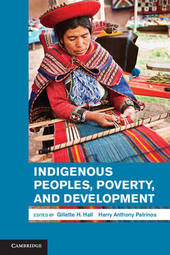
|
Indigenous Peoples, Poverty, and Development
Hardback
Main Details
| Title |
Indigenous Peoples, Poverty, and Development
|
| Authors and Contributors |
Edited by Gillette H. Hall
|
|
Edited by Harry Anthony Patrinos
|
| Physical Properties |
| Format:Hardback | | Pages:426 | | Dimensions(mm): Height 229,Width 152 |
|
| Category/Genre | Development economics |
|---|
| ISBN/Barcode |
9781107020573
|
| Classifications | Dewey:362.57089 |
|---|
| Audience | | Professional & Vocational | |
|---|
| Illustrations |
101 Tables, unspecified; 2 Maps; 38 Line drawings, unspecified
|
|
Publishing Details |
| Publisher |
Cambridge University Press
|
| Imprint |
Cambridge University Press
|
| Publication Date |
30 April 2012 |
| Publication Country |
United Kingdom
|
Description
This book documents poverty systematically for the world's indigenous peoples in developing regions in Asia, Africa and Latin America. The volume compiles results for roughly 85 percent of the world's indigenous peoples. It draws on nationally representative data to compare trends in countries' poverty rates and other social indicators with those for indigenous sub-populations and provides comparable data for a wide range of countries all over the world. It estimates global poverty numbers and analyzes other important development indicators, such as schooling, health and social protection. Provocatively, the results show a marked difference in results across regions, with rapid poverty reduction among indigenous (and non-indigenous) populations in Asia contrasting with relative stagnation - and in some cases falling back - in Latin America and Africa.
Author Biography
Gillette H. Hall is Visiting Associate Professor at the Georgetown University Public Policy Institute in Washington, DC. A development economist on leave from the World Bank, she has published journal articles and papers on poverty and development in Latin America, and is co-editor, with Harry Anthony Patrinos, of the book, Indigenous Peoples, Poverty and Human Development in Latin America (2006). At Georgetown, Dr Hall teaches a range of applied graduate courses and received the Leslie Whittington Outstanding Faculty Award in 2010. At the World Bank, in addition to research she has worked widely with governments across Latin America on poverty analysis and social protection policy reform. She holds a PhD in Economics from the University of Cambridge, UK. She has also taught at The Johns Hopkins School of Advanced International Studies (SAIS) and the University of Oregon. Harry Anthony Patrinos is Lead Education Economist at the World Bank. He specializes in all areas of education, including labor market outcomes, quality of education, school-based management, demand-side financing and public-private partnerships. He has published more than 40 journal articles and co-authored or co-edited several books, including: Making Schools Work (2011), The Role and Impact of Public-Private Partnerships in Education (2009), Indigenous Peoples, Poverty and Human Development in Latin America (with Gillette H. Hall, 2006), Policy Analysis of Child Labor: A Comparative Study (1999), Decentralization of Education: Demand Side Financing (1997) and Indigenous People and Poverty in Latin America: An Empirical Analysis (1994). Dr Patrinos previously worked as an economist at the Economic Council of Canada. He holds a PhD from the University of Sussex.
Reviews'Puts passion aside and meticulously reviews the evidence from both developed and developing countries. The results are eye-opening.' Huffington Post (online)
|